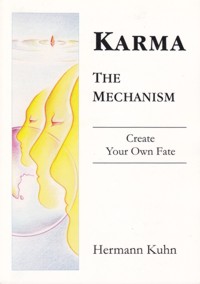
Chakshur achakshur avadhi kevalanam nidra nidranidra prachala prachalaprachala styanagriddhayashcha (7)
Karma that prevents insight and understanding (darshana-varana) obstructs
- - cognition through visual perception (chaksu)
- - cognition through the other sense-organs (achaksu)
- - cognition through clairvoyance and telepathy (avadhi)
- - cognition through omniscience (kevali jnana).
It further manifests
- - sleep (nidra)
- - deep sleep (nidranidra)
- - tiredness (prachala)
- - heavy fatigue (sleeping while sitting) (prachalaprachala)
- - somnambulism (styangriddhi). (7)
There is a basic difference between karma that obstructs access to the five channels of knowledge (sutra 6) and karma that prevents insight and understanding (sutra 7).
While the previous sutra (6) describes what blocks access to knowledge (jnana), the present sutra explains what prevents us from gaining insight (darshana) and comprehending knowledge we well have access to. These two types of karma operate on entirely different levels.
The way we gain insight, cognition, understanding - 'darshana' - is a highly delicate experience that happens before the actual perception-process (avagraha) even starts.
Perception (avagraha) is the first conscious recognition of an object after it came in contact with our sense-organs. Yet perception is not our very first connection with the perceived object. It is preceded by an experience - darshana - that arises at that moment when our senses come in contact with an object for the first time, but do not react to this sensation yet.
At that point in time darshana decides whether a 'tendency towards an object' will arise in the first place. Here a selection-process happens that allows only a few of the billions of stimuli that are constantly presented to our senses and mind to get through to our consciousness. Here - on this deeply fundamental level - it is determined whether a stimulus will develop into perception and possibly become an insight later.
darshana is influenced by all the concepts, patterns and conditionings we installed between reality and our consciousness. This filter permits contact with only those events and objects that resonate in our consciousness. Everything else might well exist and might even meet our senses, but because of this filter will never reach our perception and is thereby closed out to our consciousness.[36]
Karma that obstructs cognition - darshana - therefore does not block perception, but prevents on a far more fundamental level that the very basis for perception can be formed in the first place.
This obstruction of cognition does not manifest e.g. in form of a physical defect of our eyes or the corresponding nerves[37]. Karma that obstructs cognition prevents that a 'tendency towards an object' arises in our consciousness.
One example: We all experienced that while reading a book we needed to go over one particular paragraph again and again because our attention kept drifting to some other subject. We wanted to read, but something obstructed our cognition and diverted our attention towards entirely different subjects. Though the words reached our eyes, they did not get through to our awareness. Something was closing the book to our attention, even though we didn't want to.
Cognition is nothing other than us becoming aware of unknown areas of our own consciousness. As long as we have no 'tendency towards these unknown regions' and no 'notion that something might exist there', we will feel no inclination to explore them. We simply are unaware that they exist in the first place.
The type of karma described in this sutra prevents us from perceiving entire parts of reality because it fundamentally blocks our cognition of it. The things and experiences we miss definitely exist, but never reach our consciousness.[38]
This also explains why we will never gain complete understanding of this world by exploring only our material environment (as western science attempts to do).
Certainly - if we examine the partial environment that reaches our conscious perception, we may detect a wealth of details of this particular part, but cannot reach the abundant dimensions beyond the karmic frame of what we are able to cognize.
If we try to infer what the missing parts may look like by using only our partial - mostly materially oriented - knowledge, we get misleading results because the world beyond our known framework differs significantly from the part we perceive. A famous example is the erroneous concept of a limited flat earth that prevented the discovery of new continents (e.g. America) for a long time. The narrow circle drawn around the known continents forestalled all thoughts that other bodies of land might even exist.
Presently our Western science is in a similar limiting situation. It explores a closed range of reality that it cannot transcend. Since the perception of the main leaders of science is blocked by karma, they cannot even imagine that something might exist beyond the range of their concepts. Therefore they deny the validity of events and ideas that go significantly beyond accepted scientific reality and methods. Since these leaders generally determine what type of research or concepts are admissible, the scope of present science is limited.
Yet it makes little sense to deny mankind potential abilities and (subtle) features of this world only because certain individuals think that these perceptions and mechanisms should not be possible. Since there are proven and easy ways to gain insight into these mechanisms and to develop our potential abilities[39], we are free to discontinue the belief in limiting concepts at any time we choose. Once we start to remove our individual karmic obstructions, our perception and understanding reach automatically into unknown dimensions of our consciousness and radically expand the range accessible to us.[40]
Areas that are presently closed to our perception because of karmic mechanisms will only become accessible when we remove the corresponding karmic blocks. We will never get access to them by a more extensive exploration of the reality already known.
The first four mechanisms mentioned in this sutra describe the obstruction or total blockage of potential abilities.
The other five mechanisms are the result of exhaustion, fatigue or the aftereffects of the intake of intoxicating substances. They originate generally in the pursuit of erroneous concepts, errors etc. In this context somnambulism is defined as action beyond any conscious control.
These five mechanisms of exhaustion fall off as we reach more advanced stages of development. Shortly before entering the thirteenth stage all variations of sleep and exhaustion cease to influence us. From the end of the twelfth stage of development onwards our activities are so perfectly in harmony with the main thrust of the universe that more energy is generated than is needed for the action itself.
We get a notion of this mechanism when we work on projects that inspire us intensely. Though the work might be mentally and physically exhausting, our inspiration fuels us far beyond our usual limits. - How much more energetic will we feel when we get close to freedom from all karmic limitations.
Even in less advanced stages of development it can happen that sleep and deep sleep will cease temporarily and we experience insight how higher levels of reality feel like. This type of 'waking sleep' usually happens while we rest at night. It is typically felt as vibrant wakefulness of the mind while the body stays in a state of deep rest. The experience is agreeable. In the beginning we might mistake it for sleeplessness since we do not feel the accustomed oblivion of dream or deep sleep and our consciousness does not blank out of our body. Yet in the morning we feel totally rested though we were aware all during the time this state lasted.
Because of these characteristics we can easily distinguish 'waking sleep' from sleeplessness. Sleeplessness originates in a continued overtaxing of the psychic and physical senses caused by the pursuit of erroneous concepts, error etc.
Science is often idealized as an incontestable and incorruptible logic method that searches for an objective truth. Unfortunately this idealized image does not hold true in reality. Science splits the partial reality it perceives into a multitude of fields. It then selects a (small) aspect of one of these fields, defines conditions under which it will examine this aspect and eventually gets statements on how the aspect behaves under certain predefined conditions. All results that do not fit into the framework of this predefined setting are either ignored or suppressed.
Which aspects are researched under what conditions is determined by the main leaders of the fields. Science therefore examines always only that part of reality which is available to its leaders.
Certainly, there are attempts to re-combine all the disconnected slivers into which science split up reality to one holistic master concept. Yet these attempts are hampered by the inadequate (building) material that is the result of biased and often one-sided research (see above). All findings that go beyond the officially accepted framework of concepts cannot be used under the rules of science. Even if someone would succeed in developing a holistic model that condensed all officially accepted research into one unified whole, this 'whole' could always and only reflect the officially accepted partial 'truth', never the entirety of reality.
No doubt, science helped to make the physical conditions of life more comfortable and this also explains the popularity of this particular trend of thought. Yet when science applies its methods and concepts to areas it cannot perceive and for which they are not valid, it obstructs the exploration of these fields. Therefore the scientific methods as they are practiced today are not suited for any unrestricted development of the full human potential.
 Hermann Kuhn
Hermann Kuhn
